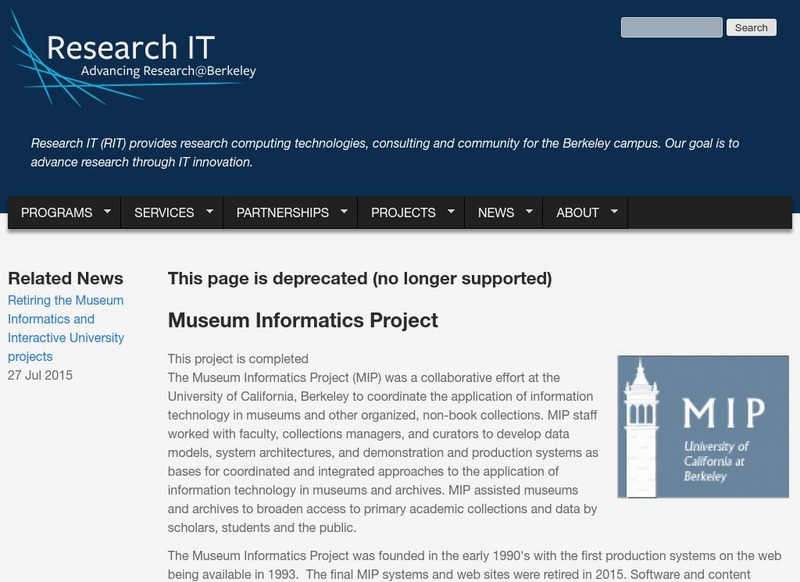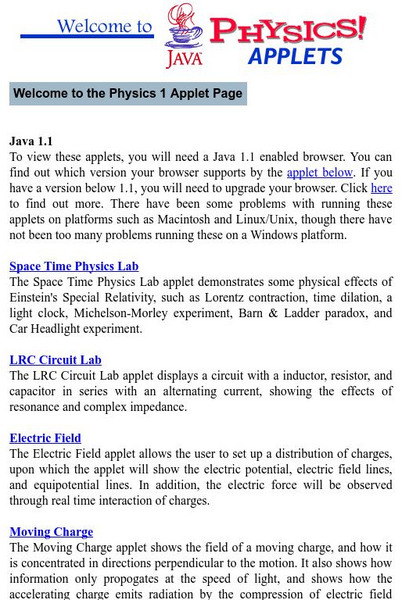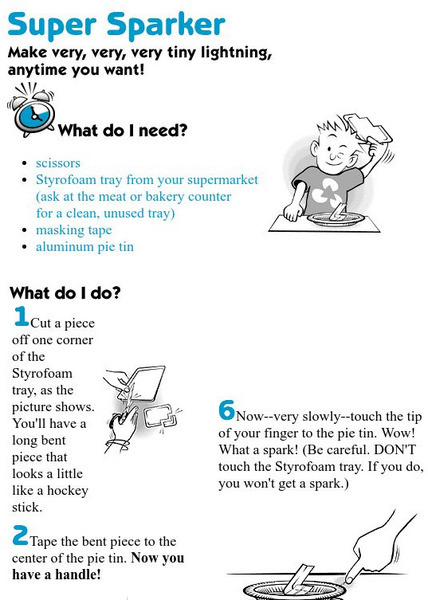Hi, what do you want to do?
University of St. Andrews (UK)
University of St. Andrews: Charles Augustin De Coulomb
A large complete authoritative biography of Coulomb. Five large pictures, over a dozen links to contemporaries, references, a poster, other mathematicians. A fine source.
National High Magnetic Field Laboratory
Magnet Academy: Leyden Jar
These devices, though quite humble, represented a tremendous breakthrough in the history of electricity; they were the first capacitors, and as such were able to store electric charge. (Java tutorial)
CK-12 Foundation
Ck 12: Millikan Oil Drop Experiment
[Free Registration/Login may be required to access all resource tools.] Describes the Millikan oil drop experiment of 1909 that demonstrated how to measure an electric charge on one electron. Includes a video demonstration of the...
Georgia State University
Georgia State University: Hyper Physics: Point Charge Potential
This site from the Georgia State University explains the concept of electric potential about a point charge or combination of severat point charges. An interactive JavaScript form allows the visitor to investigate the effect of distance...
Science Struck
Science Struck: The Relationship Between Magnetism and Electricity
Provides a short explanation of the similarities between magnetism and electricity, the properties of their fields, and the effect they each have on a charged particle.
Concord Consortium
The Concord Consortium: Molecular Workbench: Needle Electroscope
Adjust the electrical change that is present in this needle electroscope simulation.
Science4Fun
Science4 Fun: Resistors, Capacitors, and Inductors
Electric circuits are used to provide a path to electric current. They commonly use three basic electrical components, which are resistors, capacitors, and insulators. They affect the electric current and changes the behavior of the...
Thomas Jefferson National Accelerator Facility
Jefferson Lab: Reading Comprehension Passages
Read and fill in the blanks of science passages which range from easy to very hard. Each blank has a dropdown menu with choices. When you finish, click CHECK MY ANSWERS. If you pick a wrong answer, the right answer will be displayed...
University of California
University of California Berkeley: Charging an Electroscope by Induction
From the U.C. Berkeley Physics Lecture Demonstrations website. A thorough description of an activity in which a charged metal plate is used to charge an electroscope by induction. Complete directions and a diagram of the equipment and...
Wikimedia
Wikipedia: Electrical Conductivity
This is the encyclopedic entry for electrical conductivity from Wikipedia.com. The site provides a brief introduction to the topic but provides numerous links to information relative to the topic.
Science Buddies
Science Buddies: The Strength of an Electromagnet
Has anyone ever told you that you have a magnetic personality? Have you ever heard that opposites attract? These common phrases are both based on the properties of magnets and magnetic electricity. In this science fair project, learn how...
California Institute of Technology
Magnet Lab: Caltech Physics Applets
Although specifically designed for physics students at Caltech, anyone interested in learning more about electricity, magnetism or various other physical phenomena can benefit by exploring these interactive applets. A circuit tutorial...
TeachEngineering
Teach Engineering: Lights Out!
This lesson introduces the concept of electricity by asking learners to imagine what their life would be like without electricity. Two main forms of electricity, static and current, are introduced. Students learn that electrons can move...
Physics Aviary
Physics Aviary: Millikan Oil Drop Lab
This lab is designed to have students determine the charge on a series of oil drops that are suspended in an electric field. Students will measure the size of the drop in an effort to determine the force gravity on the drop. They will...
Other
Science Hobbyist: Sticky Electrostatics
A series of activities focusing on charge interactions, charging methods, and the conservation of charge. Activities utilize scotch tape and other readily available items. Includes explanations of what is happening.
MadSci Network
Msn: Why Do Some People Have Problems With Static ?
From the The Mad Scientist Network website, this page uses a question and answer format to discuss the concept of electrostatic induction. The cause of the common occurrence of an electric shock is explained.
Concord Consortium
Concord Consortium: Stem Resources: How Electrons Move
A collection of interactive activities and games to explore how electric fields and magnetic fields move electrons and charged particles in directions that can be planned. Understand that knowing how to control the movement of electrons...
CK-12 Foundation
Ck 12: Electrostatic Fields
[Free Registration/Login may be required to access all resource tools.] Electrostatic fields are explained and how to solve problems with them. Includes a simulation for exploring how charges work in an electric field.
Exploratorium
Exploratorium: Super Sparker
This is an activity using common household materials that will demonstrate a static electricity discharge.
Physics Classroom
The Physics Classroom: The Strucure of Matter
This interactive tutorial begins with an understanding of the structure of matter. Understanding charge as a fundamental quantity demands that we have an understanding of the structure of an atom. Learn the atomic structure of an atom an...
Physics Aviary
Physics Aviary: Practice Problems: Mass and Speed of a Particle
Determine the mass and speed of a particle being fired through variable magnetic and electric fields. This problem is done after students determine the charge of an electron using the Millikan Oil Drop Experiment.
Physics Classroom
The Physics Classroom: Journey of a Typical Electron
In the wires of electric circuits, an electron is the actual charge carrier. In this article, an electron's path through the external circuit is introduced.
University of Colorado
University of Colorado: Ph Et Interactive Simulations: John Travoltage
Make sparks fly with John Travoltage. Explore how charging Johnnie up and moving his hand changes how he gets shocked!
Concord Consortium
Concord Consortium: Sticking a Balloon to a Wall
A simulation to show how a charged balloon sticks to a neutral wall.
Other popular searches
- Electric Charge Behavior
- Electric Charge and Force
- Physics Electric Charges
- Electric Charges and Current
- Flow Electric Charges





















